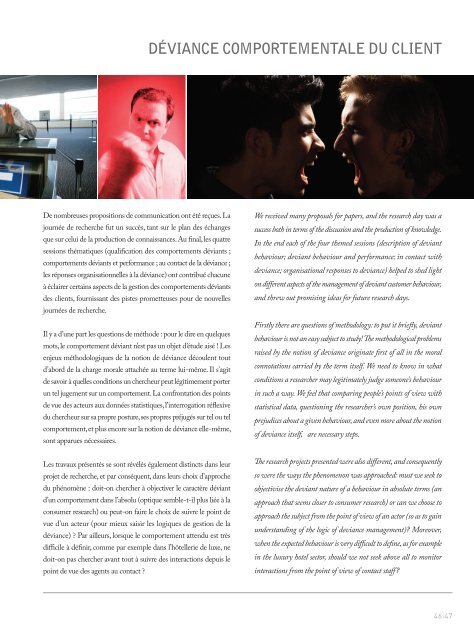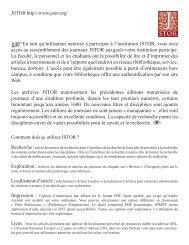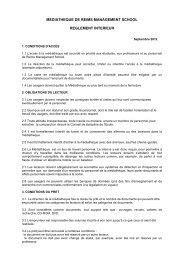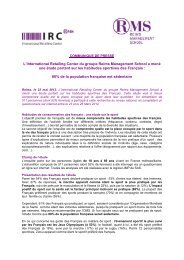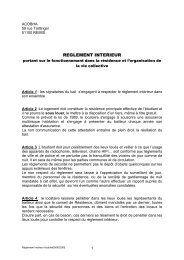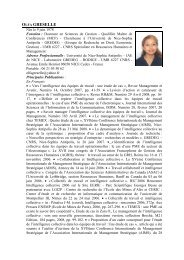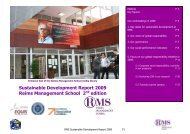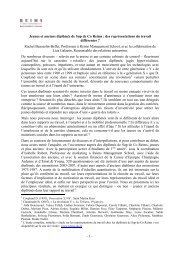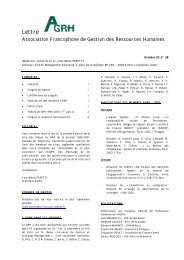tÉLÉCHARGEZ ICI ! le dernier numéro du magazine - Reims ...
tÉLÉCHARGEZ ICI ! le dernier numéro du magazine - Reims ...
tÉLÉCHARGEZ ICI ! le dernier numéro du magazine - Reims ...
You also want an ePaper? Increase the reach of your titles
YUMPU automatically turns print PDFs into web optimized ePapers that Google loves.
De nombreuses propositions de communication ont été reçues. La<br />
journée de recherche fut un succès, tant sur <strong>le</strong> plan des échanges<br />
que sur celui de la pro<strong>du</strong>ction de connaissances. Au final, <strong>le</strong>s quatre<br />
sessions thématiques (qualification des comportements déviants ;<br />
comportements déviants et performance ; au contact de la déviance ;<br />
<strong>le</strong>s réponses organisationnel<strong>le</strong>s à la déviance) ont contribué chacune<br />
à éclairer certains aspects de la gestion des comportements déviants<br />
des clients, fournissant des pistes prometteuses pour de nouvel<strong>le</strong>s<br />
journées de recherche.<br />
Il y a d’une part <strong>le</strong>s questions de méthode : pour <strong>le</strong> dire en quelques<br />
mots, <strong>le</strong> comportement déviant n’est pas un objet d’étude aisé ! Les<br />
enjeux méthodologiques de la notion de déviance décou<strong>le</strong>nt tout<br />
d’abord de la charge mora<strong>le</strong> attachée au terme lui-même. Il s’agit<br />
de savoir à quel<strong>le</strong>s conditions un chercheur peut légitimement porter<br />
un tel jugement sur un comportement. La confrontation des points<br />
de vue des acteurs aux données statistiques, l’interrogation réf<strong>le</strong>xive<br />
<strong>du</strong> chercheur sur sa propre posture, ses propres préjugés sur tel ou tel<br />
comportement, et plus encore sur la notion de déviance el<strong>le</strong>-même,<br />
sont apparues nécessaires.<br />
Les travaux présentés se sont révélés éga<strong>le</strong>ment distincts dans <strong>le</strong>ur<br />
projet de recherche, et par conséquent, dans <strong>le</strong>urs choix d’approche<br />
<strong>du</strong> phénomène : doit-on chercher à objectiver <strong>le</strong> caractère déviant<br />
d’un comportement dans l’absolu (optique semb<strong>le</strong>-t-il plus liée à la<br />
consumer research) ou peut-on faire <strong>le</strong> choix de suivre <strong>le</strong> point de<br />
vue d’un acteur (pour mieux saisir <strong>le</strong>s logiques de gestion de la<br />
déviance) ? Par ail<strong>le</strong>urs, lorsque <strong>le</strong> comportement atten<strong>du</strong> est très<br />
diffici<strong>le</strong> à définir, comme par exemp<strong>le</strong> dans l’hôtel<strong>le</strong>rie de luxe, ne<br />
doit-on pas chercher avant tout à suivre des interactions depuis <strong>le</strong><br />
point de vue des agents au contact ?<br />
DÉVIANCE COMPORTEMENTALE DU CLIENT<br />
We received many proposals for papers, and the research day was a<br />
success both in terms of the discussion and the pro<strong>du</strong>ction of know<strong>le</strong>dge.<br />
In the end each of the four themed sessions (description of deviant<br />
behaviour; deviant behaviour and performance; in contact with<br />
deviance; organisational responses to deviance) helped to shed light<br />
on different aspects of the management of deviant customer behaviour,<br />
and threw out promising ideas for future research days.<br />
Firstly there are questions of methodology: to put it briefly, deviant<br />
behaviour is not an easy subject to study! The methodological prob<strong>le</strong>ms<br />
raised by the notion of deviance originate first of all in the moral<br />
connotations carried by the term itself. We need to know in what<br />
conditions a researcher may <strong>le</strong>gitimately judge someone’s behaviour<br />
in such a way. We feel that comparing peop<strong>le</strong>’s points of view with<br />
statistical data, questioning the researcher’s own position, his own<br />
prejudices about a given behaviour, and even more about the notion<br />
of deviance itself, are necessary steps.<br />
The research projects presented were also different, and consequently<br />
so were the ways the phenomenon was approached: must we seek to<br />
objectivise the deviant nature of a behaviour in absolute terms (an<br />
approach that seems closer to consumer research) or can we choose to<br />
approach the subject from the point of view of an actor (so as to gain<br />
understanding of the logic of deviance management)? Moreover,<br />
when the expected behaviour is very difficult to define, as for examp<strong>le</strong><br />
in the luxury hotel sector, should we not seek above all to monitor<br />
interactions from the point of view of contact staff?<br />
46|47


